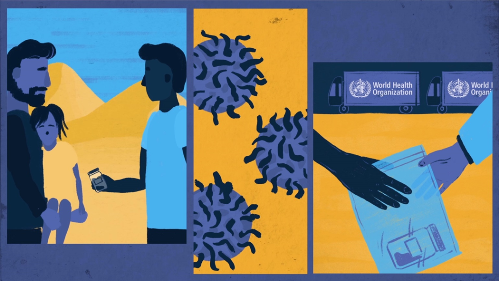A new approach is helping to improve Sudan’s ability to identify the poliovirus and remain polio-free, despite challenges
 Innovative approaches are improving the reverse cold chain in Sudan, the process by which stool samples from potential polio cases are transported carefully to a laboratory. WHO.
Innovative approaches are improving the reverse cold chain in Sudan, the process by which stool samples from potential polio cases are transported carefully to a laboratory. WHO.
16 November 2017 – It starts with a sick child, whose arms or legs have suddenly become weak and floppy. A trip to the local health centre, which could be many miles away, confirms that the child is showing classic signs of acute flaccid paralysis. This is one of the key indicators for poliovirus and kick starts the polio surveillance system into action.
Strong surveillance to identify every case of acute flaccid paralysis is the golden standard of the polio eradication programme. In countries like Sudan, where the last case of wild poliovirus was seen in March 2009, it remains critical. Even though Sudan is now polio-free, it remains at risk of reimporting the virus, so a high level of vigilance is needed while polio continues to circulate anywhere in the world.
The importance of strong surveillance in Sudan
Amid outbreaks of acute watery diarrhoea, severe malnutrition in children under 5, large-scale internal population displacement and an influx of more than 1 million refugees from South Sudan due to conflict, Sudan has managed to maintain a strong surveillance system for polio. Despite these challenges, global surveillance standards – which tell a country whether their system is sensitive enough to catch polio circulating in communities – continue to be met.
But polio remains a threat to every child, everywhere, until it is stopped for good. Today, only 3 countries remain polio endemic – Pakistan, Afghanistan and Nigeria. Countries like Sudan that are close by, with low routine immunization rates, weak health infrastructure or facing conflict and population displacement, remain at a higher risk of polio finding its way back.
The role of the reverse cold chain for surveillance
When any case of acute flaccid paralysis is found anywhere in the world, stool samples from the affected child must be transported carefully to the laboratory so that they can be tested to identify whether the poliovirus was the cause.
Mr Jaouad Tilout, from the WHO Regional Office for the Eastern Mediterranean polio eradication programme, explains that this journey undertaken by each sample is known as the ‘reverse cold chain’. “If a cold chain is what you call the transport chain that goes from a laboratory to the field – where vaccines must be kept at a certain temperature from the moment they are produced, until they are administered in order for them to work – a reverse cold chain is the process of stool samples that need to be tested getting back to the laboratory from the field at certain temperatures so that the virus that might be in the sample will still be identifiable.”
Innovations in the reverse cold chain
With support from Global Polio Eradication partners, Sudan is part of a pilot study of a new device that aims to ensure stool samples collected from acute flaccid paralysis cases reach Sudan’s National Poliovirus Laboratory in the right condition for effective testing.
Mr Jaouad Tilout says that the pilot study aims to assess whether specimens being transported are meeting global guidelines and introduce continual temperature recording probes known as ‘LogTags’ to track specimens during their journey to the lab.
Dr Christopher Hsu, from the Centers for Disease Control (CDC), and Mr Tilout co-led a 2-day workshop in Khartoum to train public health staff on the use of the new tool.
“This is a really important innovation that could be implemented in other countries of the Region, such as Yemen and Somalia, to assess their reverse cold-chain too. It’s a critical process in the end game for polio because we are looking to keep any potential poliovirus alive in the stool specimen so it can be properly notified by the laboratory,” Mr Tilout says.
The LogTag training has been delivered to 20 health staff from Sudan’s National and State health offices, the National Polio Laboratory, and the WHO Sudan country office. The study will be conducted over the next 6 to 12 months with the goal of collecting approximately 250–300 LogTag measurements. Findings from this assessment will be used to give feedback to state polio surveillance officers on any deviation from reverse cold-chain parameters.








